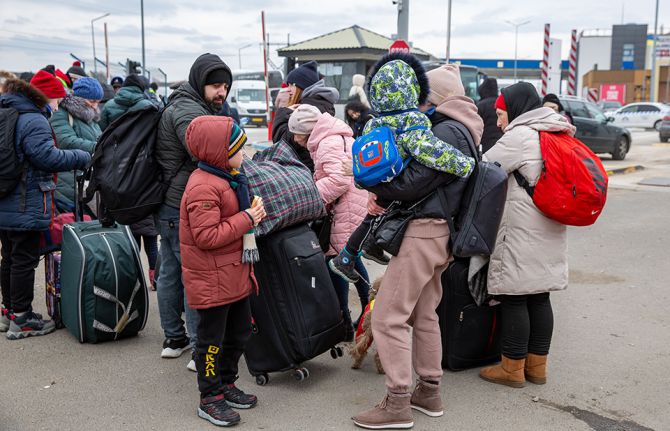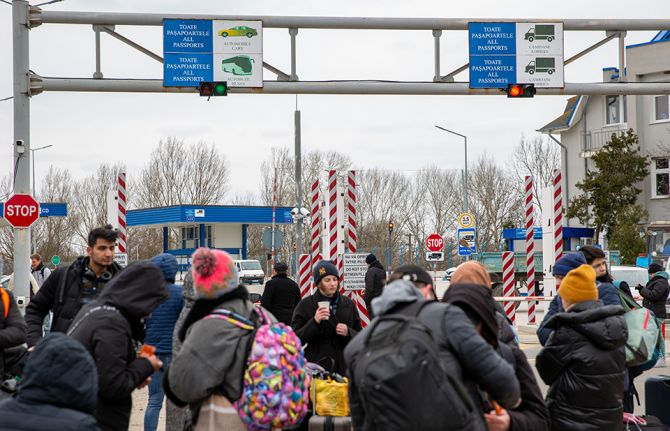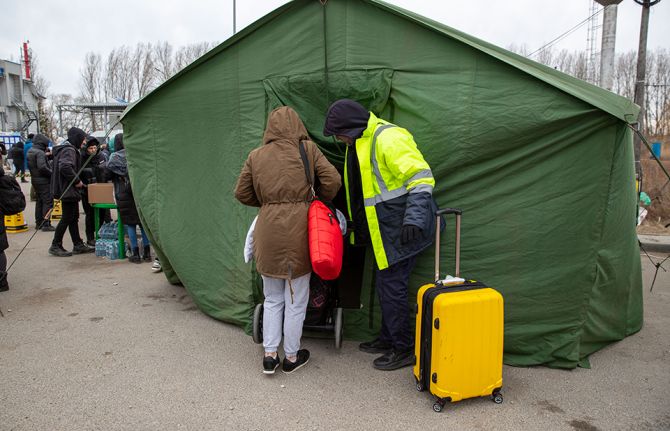



Feature Story
Working together to help refugees in the Republic of Moldova
24 March 2022
24 March 2022 24 March 2022At the start of the invasion of Ukraine, the government of the neighbouring Republic of Moldova estimated that there might be around 300 000 people fleeing to the country from Ukraine. That estimate has now increased to 1 million refugees—a huge amount for a country that has a population of only 2.6 million and is one of the poorest countries in Europe.
Soon after the start of the war, a number of humanitarian organizations, United Nations agencies and civil society partners, coordinated by the government, formed response coordination groups and started to address the most acute needs of the people fleeing the war, including shelter, food, health, social protection, the prevention of gender-based violence and mental health support.
“First, we must focus on the basic needs. A lot is yet to be done around coordination with the many humanitarian organizations joining the response. Because this is also the first time ever for Moldovans to face a crisis of this size, we are learning by doing and learning from experience,” said Iurie Climasevschi, the National AIDS Coordinator at the Hospital of Dermatology and Communicable Diseases in the Republic of Moldova.
Svetlana Plamadeala, the UNAIDS Country Manager for the Republic of Moldova, visited several displacement centres near the border of Ukraine and the Republic of Moldova. “People are well-received there, the government is ensuring accommodation and food and trying to ensure that children attend school and kindergarten, as about 75% of the refugees are women and children—there are about 40 000 children under 18 years old in the centres,” she said.
According to Ms Plamadeala, almost half of the refugees are being accommodated by families in their homes. “We see the extraordinary mobilization of ordinary people, who are providing remarkable support to people who are fleeing from the war,” she said.
The government’s policy is that Ukrainian refugees will receive the same services as Moldovans, including HIV-related services. “If any of the refugees ask for antiretroviral therapy, we provide it to anyone. We will not refuse anyone if we can help them,” said Mr Climasevschi.
“UNAIDS was part of the planning process right from the very beginning of the crisis to ensure that refugees have access to all HIV-related services that Moldovan people have, including antiretroviral therapy, opioid substitution therapy and HIV and tuberculosis testing,” said Ms Plamadeala. “Stigma and discrimination towards people living with HIV is still high. Perhaps not all people living with HIV have been able to access the services, so we are engaging with our civil society partners to proactively provide information to people so they know where to go for support.”
Ruslan Poverga, from the Initiativa Pozitiva nongovernmental organization, said that the organization is already identifying refugees in need of antiretroviral therapy and is referring them to support. “We’ve started proactively informing people, and, if required, providing an integrated package of HIV prevention services, including HIV, tuberculosis and hepatitis testing and screening, and the provision of harm reduction and condoms. We will understand the need for such services more clearly in the near future.”
The UNAIDS Country Office for the Republic of Moldova has reallocated funds for urgent humanitarian response needs. This will increase the capacity of the National AIDS Programme to provide antiretroviral therapy to a much larger number of refugees living with HIV. Viral load testing is available to check viral loads if a change of treatment regime is necessary.
“The situation is evolving. We monitor the situation very carefully to understand when and how to look for more support. The Global Fund to Fight AIDS, Tuberculosis and Malaria is ready to make reallocations if they are needed, and the Republic of Moldova is able to access resources from the Global Fund’s emergency fund. In the event that the National AIDS Programme would be not able to cover the needs, we will look for more support from the Global Fund, UNAIDS, the United Nations Children’s Fund and the World Health Organization,” added Ms Plamadeala.



